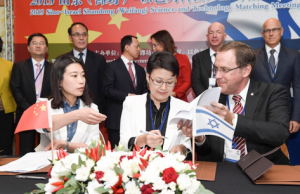A database featuring the names and descriptions of 5,000 Israeli companies, all in Chinese, was presented at the inaugural meeting of Tel Aviv University’s first alumni association in China, in the city of Nanjing. The Web-based tool is the brainchild of Sofaer International MBA graduates of TAU – including a Nanjing local. It is meant to give high-tech entrepreneurs and investors in China and Israel the opportunity to connect and work together.
The roll-out of Kaipule (pronounced “Kepler”), aimed at identifying rising stars in the start-up firmament, lies at the core of TAU’s strategy in China. The University is capitalizing on its internationally-celebrated strengths in patents, applied technology and entrepreneurship to bring Israel and China closer scientifically and economically.
Tel Aviv University has already forged links with over 30 leading universities and major Chinese cities, more than any other institution of higher education in Israel. The Nanjing alumni group emerged from a project that is bringing 1,000 senior city executives and managers to TAU’s LAHAV executive business education unit for training in innovation and entrepreneurship; other active joint projects include the XIN innovation center in the nano field with Tsinghua University in Beijing and a contemporary Israel studies center with Shanghai Jiao Tong University (SJTU).
Now, a flurry of signings and inaugurations this November has resulted in several new frameworks for partnerships between Tel Aviv University and Nanjing, Yunnan and Weifang.
Nanjing networking
The inaugural meeting of the China Alumni Association was “a historic moment” said TAU President Joseph Klafter, who arrived in Nanjing for the event. “This is the first time that Tel Aviv University alumni have gotten organized into a group in Asia.”
Along with “providing alumni and other local business people with an insider view of Israeli innovation,” the new association could also open channels for young Chinese students to attend one of TAU’s many full degree programs taught in English, Prof. Klafter said.
The occasion was marked by the signing of an MOU between the Nanjing Economic and Technological Development Zone and Tel Aviv University to explore the possibility of establishing a joint Entrepreneurship and Innovation Center. The aim of the agreement is to intensify collaboration in nurturing scientific and technological talent and pursue joint R&D.
Dignitaries attending the event included Mr. Huang Lan, Vice Mayor of Nanjing Municipal Government; Mr. Bao Yong’an, Vice Chairman of CPPCC Nanjing Municipal Committee; and Mr. Arnon Pearlman, Israel Consul General in Shanghai. The China Alumni Association leadership comprised Dr. Yan Lugen, Honorary Chairman; Mr. Qin Yinlin, Chairman; and Mr. Edwards You Lyu, Secretary-General, TAU graduate and co-founder of the association together with Ms. Orly Fromer, President’s Advisor and Director of Asian Academic Affairs at Tel Aviv University.
Yunnan Forum
At the day-long 1st China Yunnan-Israel Innovation Cooperation Forum, in southwest China, Prof. Klafter signed an MOU with Yunnan University President Prof. Lin Wenxun in the presence of Yunnan Provincial Governor Mr. Chen Hao. The two universities agreed to pursue joint research, continuing education and scholar exchange, as well as the possible coestablishment of an Innovation Research Center.
The Consul General of Israel to Chendu, Mr. Amir Lati, was on hand at the signing, which is part of a larger framework for increased Yunnan-Israel relations. Central to these efforts from the Israeli side are the Israel-China Chamber of Commerce and the financial company Sheng-BDO.
Weifang campus
Another agreement, a strategic trilateral MOU, was signed between the School of Advanced Agriculture at Peking University (PKU), the TAU George S. Wise Faculty of Life Sciences and Manna Program in Food Security, and Weifang City in Shandong Province.
The agreement covers the feasibility and planning stage of a proposed joint research center and campus in Weifang for developing new agricultural strains, that will be administered by PKU and TAU and house students and researchers from both universities.
The proposed center will use modern biology to answer the pressing food security problems, including climate change and the need for increased agricultural yields and nutrition. “Along with researching new technologies and how to best implement them, the center could enhance Chinese and Israeli agribusinesses in both local and global markets,” says Dean of Life Sciences Prof. Danny Chamovitz, who represented Tel Aviv University and was instrumental in creating the vision for the center.
Shandong Province in northeast China is one of the most heavily populated, with about 100 million people, and is considered the “Silicon Valley” of China.



















